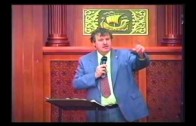Rabbi Tovia Singer Slams Bogus Claim that NT Quoted Septuagint Because it is Superior to the Hebrew
Christian apologists frequently defend Matthew’s translation of the Hebrew word alma as “virgin” by citing the Septuagint version of Isaiah. They argue that the Septuagint, a Greek translation of the Hebrew Scriptures rendered by Jewish scholars approximately 2,200 years ago, employed the Greek word for “virgin,” (“parthenos”) in Isaiah 7:14. They conclude, therefore, that the original text must have been understood to mean “virgin,” and Matthew, who was writing in Greek about the virgin birth of Jesus, was quoting the passage from the Septuagint rather than the Hebrew text. Moreover, missionaries argue that the Septuagint, which was translated more than 2,000 years ago, is far more reliable than the Masoretic Text (MT), which was compiled 1,200 years ago. Is this a valid claim?
This is one of those explanations that sound plausible until you dig a bit and think a bit more. In this powerful presentation, Rabbi Tovia Singer demonstrates that this well-worn argument is completely erroneous and deeply misleading.









